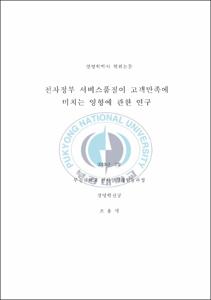전자정부 서비스품질이 고객만족에 미치는 영향에 관한 연구
- Alternative Title
- A study on the effect of customer satisfaction with Electronic Government Services Quality
- Abstract
- A study on the effect of customer satisfaction
with Electronic Government Services Quality
Yong-Seog, Cho
Doctor of Business Administration
Department of E-Commerce
The Graduate School
Pukyong National University
Abstract
The usage of e-Government services in Korea seems to be relatively low even though it is widely known to be among the top ranked countries in e-Government in the world. Thus many people think that it is an imperative to improve user satisfaction and promote usage of e-Government services. In this sense, research on user satisfaction of e-Government services will be the first step to identify ways to increase use and promote uptake of e-Government services. Several surveys over user satisfaction by many organizations have been conducted so far but they focused mainly on very limited services. There is an increasing concern about an e-Government service satisfaction model that can be applicable to all e-Government services.
This study aims to lay a foundation of an e-Government satisfaction service model to measure and analyze user satisfaction comprehensively. It identified critical factors affecting user satisfaction of e-Government services through data and evidences based on the surveys from the key actors in e-Government including citizens, businessmen, and government officials.
For the analysis, an e-Government service satisfaction model was newly figured out from the literature reviews on success models of information systems. Quality of information, quality of system, and quality of service are selected as the factors affecting user satisfaction. The type of services such as G4C, G4B, and G2G are chosen as moderating variables.
As a result of the user survey conducted on Korea's major 5 e-Government services, the e-Government satisfaction model newly developed through this study is turned out to be relevant. A diverse array of controlling effects of the type of service and usage frequency as moderator between quality factors and satisfaction levels is identified. In the process of verifying the research model, quality and satisfaction indices which can be used for overall e-Government services are identified, and a method of developing an e-Government satisfaction index is obtained.
This study has three important meanings; it provides a new e-Government satisfaction model and indicators that can measure e-Government satisfaction levels, policy implications to improve e-Government systems by service types and user types, and ways to improve user satisfaction by service. In addition, this study raise attention to introduce the quality management system in e-Government, and it also contributes to the legal reform.
- Issued Date
- 2010
- Awarded Date
- 2010. 2
- Type
- Dissertation
- Publisher
- 부경대학교
- Alternative Author(s)
- cho, yongseog
- Affiliation
- 부경대학교 일반대학원
- Department
- 대학원 전자상거래협동과정
- Advisor
- 김하균
- Table Of Contents
- 목 차
Abstract
Ⅰ. 서 론 1
1. 연구배경 및 목적 1
가. 연구 배경 1
나. 연구 목적 3
2. 연구방법 4
3. 논문의 구성 5
Ⅱ. 이론적 배경 6
1. 전자정부 6
가. 전자정부의 개념 6
나. 전자정부(서비스) 발전 모델 9
다. 우리나라의 전자정부 15
2. BSC(balanced scorecard) 29
가. BSC의 개념 29
나. BSC의 4가지 관점 31
다. 정보화사업 평가에 대한 BSC 적용 사례 33
라. 전자정부 정보시스템 성과측정 항목 선정 38
3. 서비스 품질 43
가. 서비스 품질의 개념 43
나. 전통적인 서비스 품질 44
다. 온라인 서비스 품질 45
4. 시스템 품질 49
가. 시스템 품질의 개념 49
나. 시스템 품질의 선행연구 49
다. 시스템 품질 차원 선정 50
5 정보 품질 51
가. 정보 품질의 개념 51
나. 정보 품질의 측정방법 53
다. 정보 품질의 차원 선정 54
6 관계 품질 55
가. 공감성 55
나. 쌍방향 의사소통 56
다. 세분화 서비스 57
라. 맞춤 서비스 59
Ⅲ. 연구조사방법 61
1. 연구모형과 가설설정 61
가. 연구모형 61
나. 가설설정 63
2. 변수의 조작적 정의 66
3. 조사표본의 설계 및 설문지 구성 68
가. 조사표본의 설계 68
나. 설문지의 설계 및 구성 69
4. 연구가설의 검증방법 72
Ⅳ. 실증분석 및 연구결과 75
1. 연구표본의 특성 75
가. 설문지 배부 및 회수 현황 75
나. 표본의 특성분석 76
2. 설문지의 타당도 및 신뢰도 분석 79
가. 전자정부서비스품질의 타당도 및 신뢰도 분석 79
3. 확인적 요인 분석 86
가. 전자정부 서비스 품질의 확인적 요인 분석 86
나. 구성 개념들 간의 타당도 검정 96
4. 연구결과 98
가. 모형의 적합성 검정 98
나. 가설 검정 99
Ⅴ. 결 론 106
1. 연구의 요약 106
2. 연구의 한계점 및 향후 연구 방향 108
< 참고문헌 > 110
< 부 록 > 설문지
- Degree
- Doctor
- Files in This Item:
-
-
Download
 전자정부 서비스품질이 고객만족에 미치는 영향에 관한 연구.pdf
기타 데이터 / 1.33 MB / Adobe PDF
전자정부 서비스품질이 고객만족에 미치는 영향에 관한 연구.pdf
기타 데이터 / 1.33 MB / Adobe PDF
-
Items in Repository are protected by copyright, with all rights reserved, unless otherwise indicated.